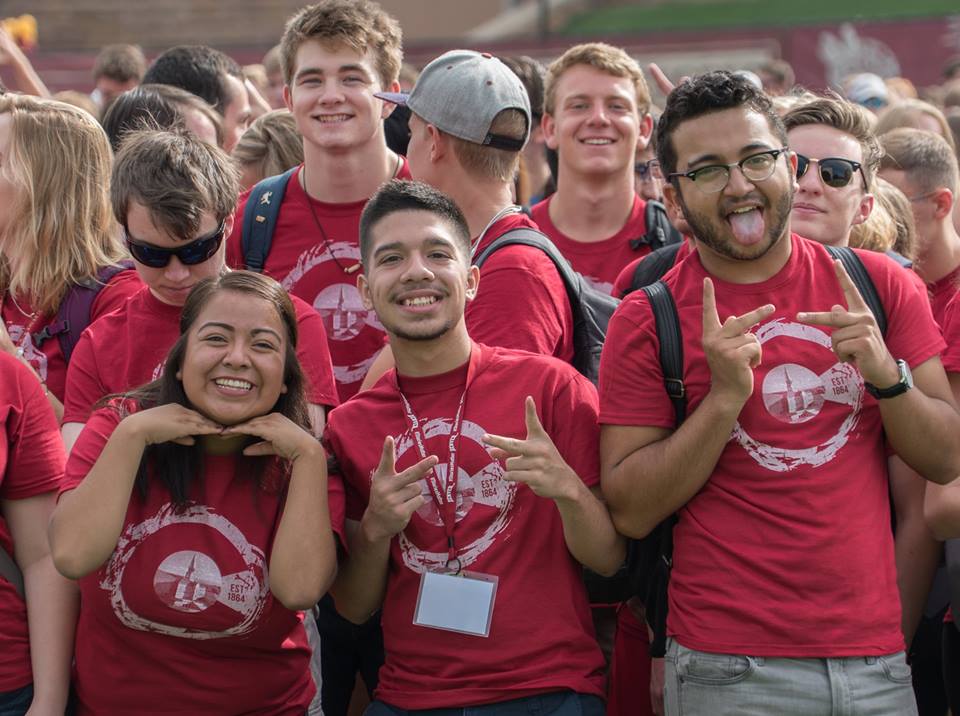A great sense of relief was collectively felt around week three or four by the new first years on campus. Classes are ramping up for midterms, but the freshman jitters are slowly calming down. Yes, homesickness might be creeping in for some, while for others new tasks have been taken on to start the year strong with activism and advocacy work, distracting from feelings of loneliness or thoughts of home. But in reality, for most, the scary yonder of the amorphous idea of college is giving way to new friendships, new experiences and a beautiful campus—and it all started with Orientation Week.
Countless hours were put in by a number of faculty, staff and returning students in preparation for the class of 2020’s first week at DU. The result was what some affectionately call “O-Week” and what others tiredly remember as a long-past introduction to their new life. Either way, the reactions to this marathon of a week are quite dynamic. So, what is the best way to balance mental and physical health with social and university necessities?
Well, to begin with, DU is already doing a lot of things right. First year student Matthew Greenlee appreciated how DU “built a sense of community” during his first week on campus. He found that splitting students into their Freshman Seminar (FSEM) groups and having those groups led by returning students fostered this initial sense of belonging.
Anna Daley-Larson, a first year student who went through Orientation this year, appreciated the “fun nighttime activities,” while fellow freshman Nana Danso “loved the structure [of Orientation]” specifically because she felt that it “helped [her] meet new people.”
There are definitely students that see Orientation as a coming out, debutante-esque affair. However, Danso quickly explained that she thought the “first day was far too packed.”
Many freshman and Residential Advisors (RA) share this sentiment. Some carry that same feeling though the entire week of orientation.
Chris Florez, a sophomore RA on the first floor of Johnson-Mcfarlane, expressed his concern for the well being of his hall residents, saying that the week is “physically and mentally exhausting.”
JJ Khan, sophomore, another RA, regretted that he did not always have the necessary information to give to his hall residents.
So, what can DU work on? Freshman Maddie Kincaid needed “more time to move in to” her dorm. First year Jack Cote wished that certain seminars had been shorter in order to make them feel less repetitive. New Pioneer Merrick Vanheuckelom wanted a stronger focus on setting up his academics. But, overall, the two largest places of improvement fell within communication and time. Some people believe a longer orientation is the answer. Others simply want better communication to the students about when activities are happening and which ones are mandatory.
Personally, as a freshman myself, I found the week constricting. It was an exhausting marathon of social activities and, by the end of the week, I barely had any time to establish a sense of place on campus and in Denver.
The idea of inclusive excellence was practically force fed to us throughout the week and yet I cannot recall a single time when it was acknowledged that this is an area that DU has serious room to improve on. We cannot fix a problem that we refuse to see. This is clearly a wealthy, predominantly white institution with only six percent of the undergraduate student population having been awarded the Federal Pell Grant in 2014, according to the U.S. Department of Education. That is not a statistic that supports DU’s claims of diversity, which is honestly okay—but it should at least be acknowledged during our first week that we are not a diverse institution, we are working to be one.
Also, despite what I suppose was the plan, our FSEMs were not instant friend groups. Many people found a family in theirs, but others felt disjointed because if they couldn’t fit in with this arbitrary placement of people, they were out of luck making friends during their first week at college. That can be debilitating. There is also the repeated issue of not having time in our halls. These are the people that we will be living with for roughly 30 weeks and no one seemed to think it important for us to get to know each other.
I would like to take the time to acknowledge that I, along with a large chunk of my class, greatly appreciate the time and energy put in by so many people to make us feel welcome.
The truth is that, while cliché, you can not please everyone. Some people enjoyed being grouped with their FSEMs, others wanted to meet more people. Some wanted more nighttime activities, others wanted more free time. Some wanted more time to say goodbye to their parents, while others wanted them gone sooner rather than later.
That leaves the drumroll for a consensus—more time. First year students wanted more time to hang out, more time to sleep, more time to figure out their schedules. Some purported that all they wanted was more time to get to know their roommate(s)—the people they were sleeping next to at night.
Conclusion? The Class of 2019 had five days of Orientation Week. The Class of 2020 had four days. We felt the difference.










